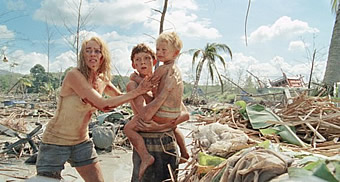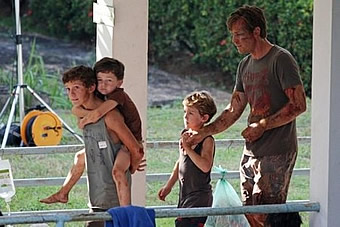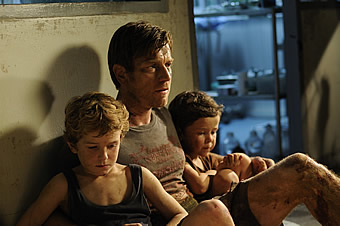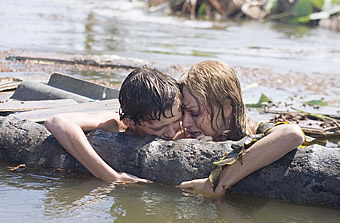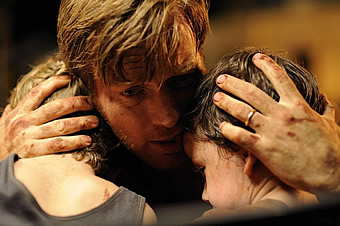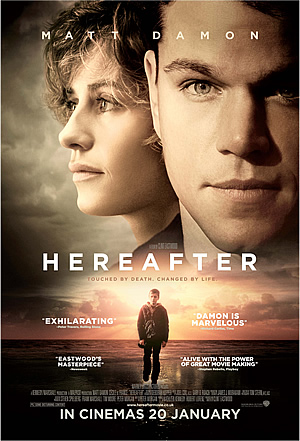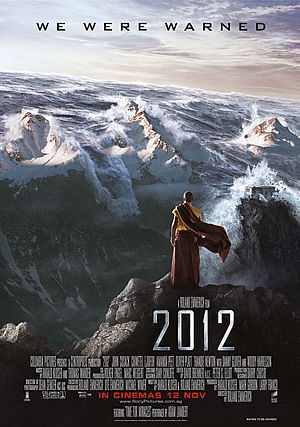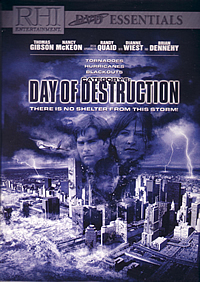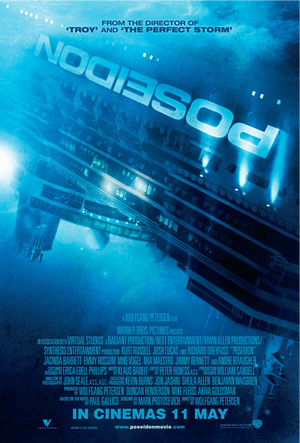THE IMPOSSIBLE (2012)
Genre: Drama/Thriller
Director: Juan Antonio Bayona
Cast: Ewan McGregor, Naomi Watts, Geraldine Chaplin, Tom Holland, Samuel Joslin, Oaklee Pendergast
RunTime: 1 hr 48 mins
Rating: PG13 (Disturbing Scenes and Brief Nudity)
Released By: Shaw
Official Website: http://www.theimpossible-movie.com/
Opening Day: 17 January 2013
Synopsis: Maria (Naomi Watts), Henry (Ewan McGregor) and their three sons begin their winter vacation in Thailand, looking forward to a few days in tropical paradise. But on the morning of December 26th, as the family relaxes around the pool after their Christmas festivities the night before, a terrifying roar rises up from the center of the earth. As Maria freezes in fear, a huge wall of black water races across the hotel grounds toward her. Based on a true story, THE IMPOSSIBLE is the unforgettable account of a family caught, with tens of thousands of strangers, in the mayhem of one of the worst natural catastrophes of our time. But the true-life terror is tempered by the unexpected displays of compassion, courage and simple kindness that Maria and her family encounter during the darkest hours of their lives. Epic, intimate, devastating and uplifting, THE IMPOSSIBLE is a journey to the core of the human heart.
Movie Review:
No circumstance has the power to unleash the potential of the human spirit as potently as that of an epic tragedy, and ‘The Impossible’, set against the 2004 Indian Ocean tsunami, is an ode to the ability of mankind to rise above the most awful circumstances. Based on a true story, it takes an intimate approach to chronicle the devastation and destruction of the disaster through the eyes of a family who were separated from each other in the aftermath but managed to reunite with one another after many harrowing days apart.
When we first meet the family, they are on a plane to Thailand, having booked their Christmas vacation at the Orchid Beach Resort in Chao Lak. British-born businessman Henry Bennett (Ewan MacGregor) reveals himself to be quite the worrier, fretting over whether they had set the alarm to their house even after his wife Maria (Naomi Watts) repeatedly reassures him that she had done so. The couple have three boys – Lucas (Tom Holland), Thomas (Samuel Joslin) and Simon (Oaklee Pendergast) – but more attention is spent on the eldest, Lucas, precocious and reluctant to indulge the childish whims of his younger brothers.
Not a single frame here is wasted, and the few detailing their two days of bliss before the catastrophe establish Henry and Maria as a loving couple not without their worries of supporting the family, as well as the dynamic between the three boys. Then, true to the nature of the calamity, tragedy strikes out of the blue one peaceful Boxing Day morning, the impact of the 98-foot high waves carrying all sorts of debris separating Maria and Lucas from Henry, Thomas and Simon.
The vivid reconstruction of those terrifying moments when the wave hit is stunning. By seamlessly integrating on-location sets with CGI-ed footage shot inside an artificial water tank, the 10-minute sequence fully immerses you into the moment, letting you feel the fear, helplessness and sheer terror of Maria and Lucas as they struggle to stay together amid the swirling waves. The sound design in this respect is outstanding, cutting between moments of silence when either one dips below the surface of the water to the sound of crashing water when they manage to lift their heads – and the elemental quality of the filmmaking gives the entire sequence a raw vise-like intensity.
While you would expect a reprieve after that gripping scene-setter, what comes next proves to be equally riveting. Besides emphasising their peril made worse by the extent of Maria’s injuries – in particular, a deep gash on her right leg right behind the knee - another equally compelling theme is found in mankind’s ability to exhibit noble compassion despite one’s situation. Three instances of that is demonstrated – first, when Maria insists that Lucas search for the source of a child’s cry for help (it turns out to be a small boy named Daniel); second, when a group of Thai villagers whom Maria and Lucas chance upon go out of their way to help Maria get to the hospital for medical attention; and thirdly, when Lucas takes it upon himself at the hospital to help others locate their loved ones amidst the vast compound.
Rather than switching between the separated couple, the first half of the movie after the tsunami is devoted to Maria and Lucas’ ordeal, up until the point when she is hospitalised. Then a change in perspective shows Henry, with Thomas and Simon in tow, frantically searching for the whereabouts of his wife, refusing to give up even though the staggering number of dead bodies around might have given pause to his hope that Maria might have made it out alive.
Because Henry is in a much better physical state than Maria, this side of the story is slightly less harrowing than the first; nonetheless, a particular noteworthy scene is the one where Henry calls home to find out if Maria had previously contacted his parents and breaks down uncontrollably. It is the first time a character is seen to be overcome with despair, and the surest indication of just how judiciously the movie had rejected mawkish sentimentality despite how straightforward that would have been.
The same restraint is demonstrated later on when the family finally finds one another, and the immediate sequence preceding that is an excellently shot one that melds the points-of-view from the various family members with a will-they-or-won’t-they suspense built up with a string of near-misses. Kudos to director J.A. Bayona for the elegance he brings to that sequence, carefully controlling the emotions from going hysterical or melodramatic and using Fernando Velazquez’s score to emphasise the feelings of anxiety, relief and eventually overwhelming joy.
His sophomore feature after the atmospheric Spanish horror ‘The Orphanage’, Bayona strikes an impressive balance between realism and dramatization, such that the scenarios are dramatized with the utmost respect for emotional realism. The re-enactment of the tsunami is a towering achievement in itself, but easily overlooked here is how Bayona manages to marshal hundreds of extras within the hospital compound to convey the magnitude of the disaster.
Bayona is also aided by excellent performances from Naomi Watts and Ewan MacGregor. Watts is startlingly convincing as the mother who finds herself slipping away quickly even as she tries to hold out against hope that her husband and two other children are safe. It is as unpretentious a performance as any, and the actress pretty much disappears into the role. Next to Watts, MacGregor conveys keenly the fear and desperation of his character searching for the whereabouts of the rest of his family. In addition, British stage actor Tom Holland proves to be quite a revelation here, holding your attention with a heartfelt performance as his character is forced to mature in order to rise up to the occasion.
In 'The Impossible', Bayona eschews the narrative convention of such disaster movies to tell an utterly riveting portrait of the power of the human spirit. This is one of the most harrowing disaster movies that we have seen in recent years, not just for its depiction of the disaster alone but also in its portrayal of the destruction and devastation in the aftermath. Bleak and realistic though it may be, but it eventually packs such a potent emotional punch in delivering a life-affirming message about hope and humanity that only the hardest of hearts would not be moved.
Movie Rating:





(Masterfully balancing the terror of the disaster with the vivid emotions of the characters, this portrait of a family’s ordeal following the 2004 Indian Ocean tsunami is an incredibly moving portrait of hope, perseverance and compassion)
Review by Gabriel Chong
You might also like:
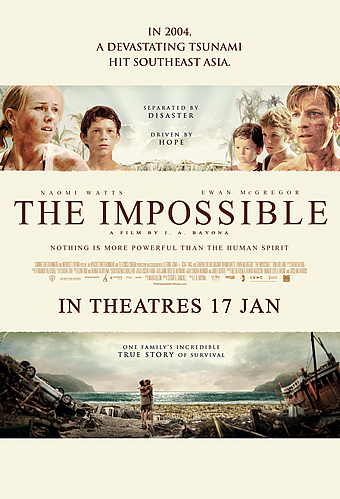
Movie Stills
